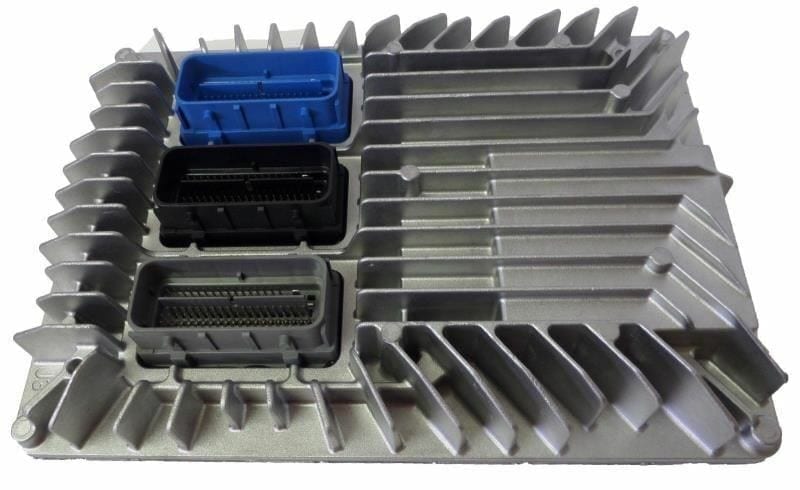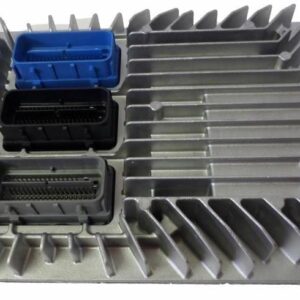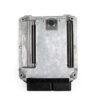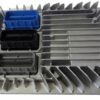Restore Peak Performance and Reliability to Your GM Vehicle
Is your car suffering from frustrating, hard-to-diagnose issues like stalling, a persistent check engine light, or a complete no-start condition? A failing Engine Control Module (ECM) is often the culprit, acting as the brain of your vehicle and controlling everything from fuel mixture to spark timing. When it falters, the entire system can become unreliable. This replacement ECM, part number 12616889, is the definitive solution to get your vehicle running smoothly again.
With over two decades of hands-on diagnostic experience, I’ve seen countless drivers spend a fortune chasing symptoms when the core issue was a faulty computer. This isn’t just a part; it’s a professionally prepared, plug-and-play fix. We take the guesswork and extra expense out of the equation by programming the module specifically to your vehicle’s VIN before it ships. This means it arrives loaded with the latest GM factory software, ready for installation without needing a trip to the dealership for expensive programming.
From the Diagnostic Bay: The Intermittent Impala
A customer brought in a 2012 Impala that had been to three other shops for random stalling. It would run fine for days, then suddenly die at a stoplight. No codes were stored consistently. After checking fuel pressure, which was good during testing, I hooked up a lab scope to monitor the fuel pump relay command from the ECM. For two hours, it was perfect. Then, I saw it—a momentary drop in the command signal, just before the engine sputtered. The ECM’s internal driver was failing intermittently under heat load. We replaced it with a pre-programmed module like this one, and the customer called a month later to say the car had never run better. This is why a quality, correctly programmed 2010 Allure Engine Control Module is critical.
Common Signs of a Failing Engine Control Module
If your vehicle is exhibiting any of the following symptoms, a failing ECM could be the root cause. Replacing it can restore performance and peace of mind. Common diagnostic trouble codes (DTCs) associated with this failure include P0601, P0606, and various U-codes for loss of communication.
- ✔ Check Engine Light is on or flashes intermittently
- ✔ Engine cranks but refuses to start
- ✔ Unexplained drops in fuel economy
- ✔ Rough idling, stalling, or hesitation during acceleration
- ✔ Automatic transmission shifting issues
- ✔ Loss of communication with other vehicle modules
- ✔ Performance issues that mechanics can’t seem to trace
A Straightforward Guide to Installation
Installing your new ECM is a simple process that most DIYers can handle with basic tools. Because we program it beforehand, you avoid complex procedures. Here’s a typical installation process:
- Safety First: Disconnect the negative terminal from your vehicle’s battery to prevent any electrical shorts.
- Locate the ECM: On most compatible models, the ECM is found in the engine bay, either on the driver’s side (LH) or mounted to the air cleaner assembly. Check your specific model’s service information if you’re unsure.
- Disconnect Harnesses: Carefully release the locking tabs on the electrical connectors and pull them straight out from the module. Do not force them.
- Remove the Old Module: Unbolt the old ECM from its mounting bracket and remove it from the vehicle.
- Install the New Module: Bolt your new, pre-programmed 2010 Allure Engine Control Module into place.
- Reconnect Everything: Firmly plug the wiring harnesses back into the new ECM until they click, and then reconnect the negative battery terminal.
- Final Check: Some vehicles may require a security relearn procedure, which typically involves cycling the key. Start the engine and ensure the check engine light is off and the vehicle runs smoothly.
Will This Fit My Vehicle?
This ECM is a direct-fit replacement for a wide range of General Motors vehicles and is compatible with multiple part numbers, including 12616889, 12630908, 12637106, 12642665, 12650256, and 12651993. Please verify your vehicle is on the list below. If you have any questions, provide your VIN and we can confirm compatibility for you.
Cadillac: CTS (2010-2012), SRX (2010-2011)
Chevrolet: Camaro (2012), Captiva Sport (2012), Equinox (2010-2011), Impala (2012), Orlando (2012-2013)
GMC: Terrain (2010-2011)
Saab: 9-5 (2010-2011)
Note: Specific engine and option compatibility is detailed in the original fitment data. Please match your part number or contact us with your VIN.
By choosing this pre-programmed 2010 Allure Engine Control Module, you are getting a reliable, cost-effective solution that restores your vehicle’s factory performance without hidden fees or complex procedures.
Frequently Asked Questions
Do I need to get this ECM programmed by a dealer?
No. We handle all the programming for you before shipping. Simply provide your vehicle’s VIN during checkout, and it will arrive ready to install with the latest GM software for your specific vehicle.
How do I find my original part number?
The part number is printed on a sticker on your current ECM. You can compare it to the list of compatible numbers: 12616889, 12630908, 12637106, 12642665, 12650256, or 12651993.
Is this a guaranteed fix for my car’s problems?
While this ECM corrects issues caused by a faulty module, it’s crucial to ensure your vehicle has been properly diagnosed. This part will not fix problems related to other faulty components like sensors or wiring.
What is a VIN and why do you need it?
The VIN (Vehicle Identification Number) is a unique 17-digit code for your car. It allows us to load the exact software and calibrations for your vehicle’s specific engine, transmission, and options, ensuring perfect compatibility.
Will I need to perform a security relearn procedure?
On many GM vehicles, a simple security relearn is automatic or may require cycling the ignition key (e.g., turn to ‘ON’ for 10 minutes, then ‘OFF’, and repeat 2-3 times). This syncs the new ECM with your vehicle’s anti-theft system. Instructions are readily available online for your specific model.



